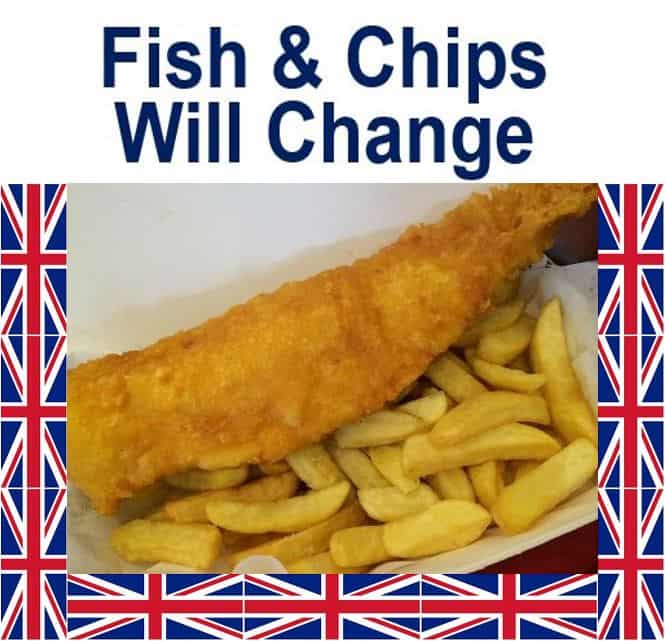Fish and chips may soon lose the plaice or haddock and be replaced by John Dory, red mullet or squid if the North Sea continues warming at its present much faster than world-average rate, a group of researchers has warned. Our traditional fish choices will become far too expensive.
Water temperature, and in some cases sea depth, decide how abundant some species of fish are. If temperatures change several species of fish either migrate or simply become less successful and consequently scarcer.
As the North Sea becomes warmer, populations of Dover sole, plaice and haddock will decline, and British waters will see an invasion of squid, cuttlefish, anchovies, John Dory, gurnard, Red Mullet and sardines.

Plaice and chips will become the expensive, luxury option within the next few decades.
Since the 1970s, the North Sea’s temperature has been rising much faster than the global average, in fact, four times faster, scientists wrote in the journal Nature Climate Change.
All evidence suggests the North Sea will continue getting warmer over the next 100 years, which prompted a group of scientists from the UK, Ireland and Australia to try and determine what the impact might be on commercial species of fish.
They developed a model that included climate model predictions from the Met Office plus long-term fisheries datasets that forecast the abundance and distribution of Britain’s favourite fish over the next fifty years.
As the North Sea gets warmer, they found, several species of fish will have to move elsewhere if they want to thrive. However, many won’t be able to migrate northwards, because the sea is the wrong depth.
Many species will become less abundant
Several fish species in the North Sea will see their populations decline as a result of higher temperatures, the authors wrote. This means they will become much more expensive, particularly haddock, plaice and Dover sole.
Louise Rutterford, a PhD student at the College of Life and Environmental Sciences, University of Exeter, said:
“Our study suggests that we will see proportionally less of some of the species we eat most of as they struggle to cope with warming conditions in the North Sea.”
“We provide new insight into how important local depths and associated habitats are to these commercial species. It’s something that is not always captured in existing models that predict future fish distributions.”

Will Brits start switching to squid and chips?
Dr. Martin Genner, Senior Lecturer in Fish Ecology and Evolution at the University of Bristol, said:
“Long-term standardised fisheries surveys from many European countries, alongside leading climate models for the region, mean it is a unique region to develop and test new modeling approaches.”
“The modeling technique used in this analysis performed remarkably well when tested on available long-term datasets. This provides real confidence in the model’s ability to predict future patterns of fish distributions around the UK.”
Changes noticeable within a few decades
Dr. Genner and colleagues said their findings are important for both the fishing industry and consumers of fish in the UK. Changes are likely to be seen within the next few decades, they added.
Dr. Steve Simpson, who is a Senior Lecturer in Marine Biology & Global Change at the University of Exeter, said:
“Our models predict cold water species will be squeezed out, with warmer water fish likely to take their place. For sustainable UK fisheries, we need to move on from haddock & chips and look to Southern Europe for our gastronomic inspiration.”
Reference: Louise Rutterford, Stephen Simpson, Simon Jennings, Mark Johnson, Julia Blanchard, Pieter-Jan Schön, David Sims, Jonathan Tinker and Martin Genner. “Future fish distributions constrained by depth in warming seas.” Nature Climate Change. Published 13 April, 2015. DOI: 0.1038/nclimate2607.
